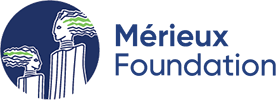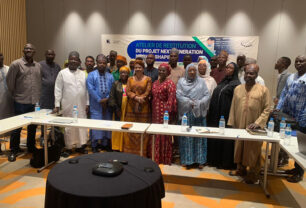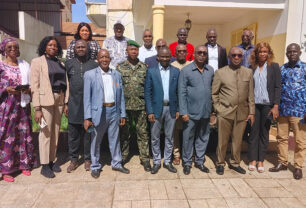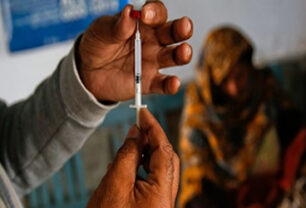
The Mérieux Foundation team responsible for health education projects, consisting of Nivo Ramanamihantatsoarana, Philippe Vanhems, Mario Rafanomezantsoa, Leticia Lobo-Luppi, and Luciana Rakotoarisoa, shared the results of a pilot assessment of WASH, a project run by the team in partnership with RANO WASH and HappyTap in Malagasy public schools. The project aimed to combine three separate approaches: the Mérieux Foundation’s WASH educational kits, RANO WASH’s ‘nudges’, and HappyTap’s portable hand-washing equipment.
Good hand hygiene is part of a more global physical hygiene approach, but it also helps control the transmission of certain infections spread via the hands. The results of the pilot study, entitled ‘Assessment of three WASH approaches combined in public primary schools in Madagascar’, were encouraging. On average, the three approaches generated a 45% increase in the number of times hands were washed with soap. The analysis also proved the feasibility of both the separate approaches and the combined approach to stimulate the adoption of good hygiene practices.
‘The WASH pilot assessment, carried out in collaboration with the USAID RANO WASH program and the social enterprise HappyTap, demonstrated the feasibility and acceptability of the WASH educational kit alongside nudges and hand-washing equipment to change behavior sustainably in terms of hand-washing with soap in public primary schools,’ said Nivo Ramanamihantatsoarana, a member of the Malagasy delegation at the congress. ‘These results, which I presented at the ADELF-EPITER congress, showed encouraging prospects. A deeper study would make it possible to formulate robust recommendations for the national education ministry and the players involved in WASH about how to incorporate these initiatives into public policy. The congress was also a valuable opportunity to share these conclusions and talk to experts from 30 countries.’
Although the results are positive, several methodological challenges were identified. Applying a quasi-experimental design to compare three modalities (the approaches taken separately, a combination of the three approaches, and the control school with no intervention) remains difficult, but the study underlines its feasibility. Despite this, the conclusions suggest encouraging prospects that could be strengthened with a large-scale study. The results of such a study could provide recommendations to support Malagasy public policy in terms of hygiene in schools.
For Professor Philippe Vanhems, Public Health Program Director at the Mérieux Foundation, ‘Taking part in this congress enabled the Malagasy team to demonstrate its expertise and engage in enriching discussions about the challenges and opportunities of this type of research in an international context.’
The exchanges strengthened collaboration between players in the WASH sector while opening up new directions for future research. Sharing these results encourages new initiatives to sustainably improve school hygiene in Madagascar and beyond.




